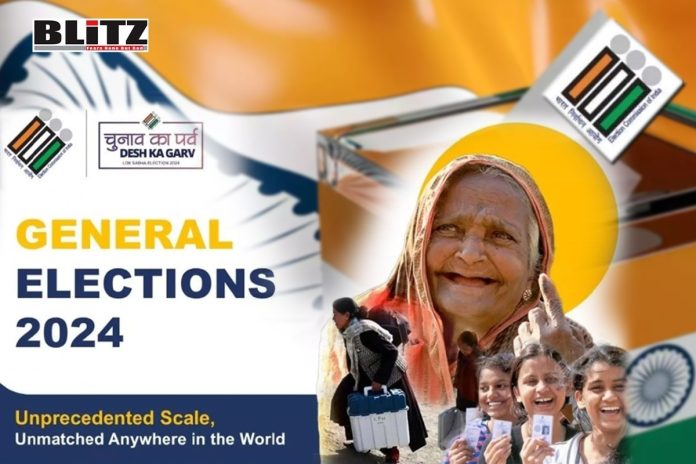As the sun rises over the vast expanse of the Indian subcontinent, India, the world’s largest democracy, stands on the threshold of a historic electoral journey. With an astonishing nearly billion-strong electorate, the upcoming national polls, kicking off on April 19, symbolize a watershed moment in the country’s democratic evolution. Extending over seven distinct phases and spanning a six-week period until June 1, this extensive election process underscores the deep-rooted commitment of the Indian populace to democratic participation and civic responsibility.
Leading the charge in this democratic spectacle is Prime Minister Narendra Modi, a towering figure whose political acumen and Hindu nationalist vision have left an indelible mark on India’s political arena. Having served two terms in office, Modi’s quest for a third reign appears formidable, bolstered by his steadfast popularity and a well-oiled electoral apparatus. His leadership embodies a potent blend of charisma and strategic prowess, positioning him as a formidable contender in the upcoming electoral contest.
Yet, amidst the anticipation of Modi’s potential triumph, questions linger about the fairness of the electoral playing field. Critics point to a landscape marred by allegations of political bias and legal maneuvering aimed at stifling dissent and hobbling opposition forces. The Bharatiya Janata Party (BJP), under Modi’s leadership, has faced accusations of leveraging state institutions to marginalize political adversaries, raising concerns about the erosion of democratic norms.
As the electoral clock ticks down, Chief Election Commissioner Rajiv Kumar reaffirms India’s unwavering dedication to safeguarding democratic values. “We are committed to bringing democracy to every nook and cranny of the nation,” Kumar asserts, emphasizing the monumental undertaking and the critical importance of guaranteeing a transparent and impartial electoral process.
The political arena is primed for a clash of titans as the ruling Bharatiya Janata Party (BJP) squares off against a fractured opposition, spearheaded by the venerable Indian National Congress. Once at the forefront of India’s fight for independence, Congress now navigates internal strife and diminishing sway within the political spectrum. In a strategic maneuver aimed at countering the BJP’s electoral dominance, Congress has endeavored to cultivate alliances with regional entities, aspiring to unite disparate forces in a concerted effort to challenge Modi’s formidable political apparatus.
Yet, internal divisions within the opposition coalition jeopardize its unity, as disagreements over seat allocations and leadership disputes erode cohesion. Seizing the opportunity, the BJP adeptly exploits these rifts to bolster its hold on authority, leveraging the disarray within its rivals to solidify its position of power.
In the midst of political maneuvering and the dramatics of electioneering, apprehensions endure regarding the condition of India’s democracy. Critics lament what they perceive as a gradual drift towards authoritarianism, propelled by the BJP’s robust nationalism and the deepening religious divide. These trends elicit a palpable unease among India’s sizable Muslim minority, who confront mounting concerns of marginalization and discrimination amidst a politically polarized environment.
Opposition figure Rahul Gandhi, hailing from the esteemed Nehru-Gandhi lineage, stands out as a fierce critic of the BJP’s governance. He vociferously critiques what he views as a decline in democratic values and the growing marginalization of minority groups. Despite Gandhi’s earnest attempts to rally the opposition and spotlight these concerns, Modi’s appeal among voters remains robust. Bolstered by pledges of economic growth and a strong nationalist narrative, Modi’s popularity seems largely undiminished, posing a formidable challenge to Gandhi’s efforts.
Against this backdrop of political intrigue and electoral drama, the fate of India’s democracy hangs in the balance. As citizens across the country prepare to cast their ballots, the world watches with bated breath, mindful of the stakes involved in this grand spectacle of democratic expression.
In the upcoming weeks, a vast multitude of voters will flock to polling stations spanning the vast expanse of India, exercising their foundational right to elect their leaders. From the vibrant urban hubs of Mumbai and Delhi to the tranquil hamlets of rural India, the heartbeat of democracy resonates strongly throughout the nation. This widespread participation underscores the enduring strength and resilience of India’s democratic foundations, reaffirming the collective commitment to democratic governance across diverse landscapes.
Ultimately, India’s extensive national election transcends beyond a mere political competition; it serves as a reaffirmation of the core principles embedded in the nation’s foundational values. As voters gear up to cast their ballots, the real measure of India’s democratic strength is not solely determined by the election results but is deeply rooted in the integrity and transparency of the electoral process. In the true essence of democracy, the voice of the populace must be paramount, safeguarding India’s legacy as a shining example of democracy and pluralism for future generations.




